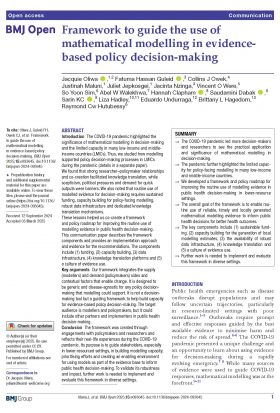This website uses cookies so that we can provide you with the best user experience possible. Cookie information is stored in your browser and performs functions such as recognising you when you return to our website and helping our team to understand which sections of the website you find most interesting and useful.
Framework to guide the use of mathematical modelling in evidence-based policy decision-making

รายละเอียดเพิ่มเติม
Abstract
Introduction The COVID-19 pandemic highlighted the significance of mathematical modelling in decision-making and the limited capacity in many low-income and middle-income countries (LMICs). Thus, we studied how modelling supported policy decision-making processes in LMICs during the pandemic (details in a separate paper).
We found that strong researcher–policymaker relationships and co-creation facilitated knowledge translation, while scepticism, political pressures and demand for quick outputs were barriers. We also noted that routine use of modelled evidence for decision-making requires sustained funding, capacity building for policy-facing modelling, robust data infrastructure and dedicated knowledge translation mechanisms.
These lessons helped us co-create a framework and policy roadmap for improving the routine use of modelling evidence in public health decision-making. This communication paper describes the framework components and provides an implementation approach and evidence for the recommendations. The components include (1) funding, (2) capacity building, (3) data infrastructure, (4) knowledge translation platforms and (5) a culture of evidence use.
Key arguments Our framework integrates the supply (modellers) and demand (policymakers) sides and contextual factors that enable change. It is designed to be generic and disease-agnostic for any policy decision-making that modelling could support. It is not a decision-making tool but a guiding framework to help build capacity for evidence-based policy decision-making. The target audience is modellers and policymakers, but it could include other partners and implementers in public health decision-making.
Conclusion The framework was created through engagements with policymakers and researchers and reflects their real-life experiences during the COVID-19 pandemic. Its purpose is to guide stakeholders, especially in lower-resourced settings, in building modelling capacity, prioritising efforts and creating an enabling environment for using models as part of the evidence base to inform public health decision-making. To validate its robustness and impact, further work is needed to implement and evaluate this framework in diverse settings.
Original source: https://bmjopen.bmj.com/content/15/4/e093645.long




